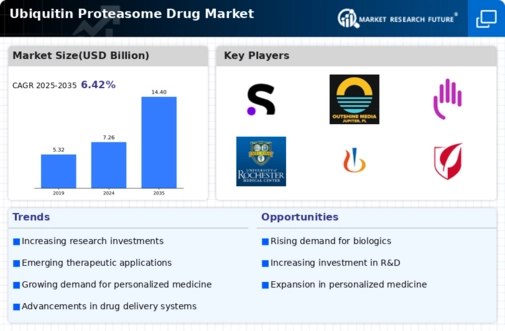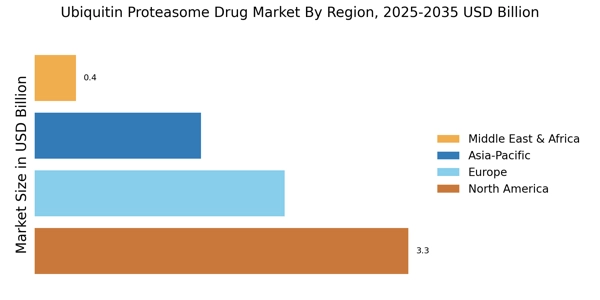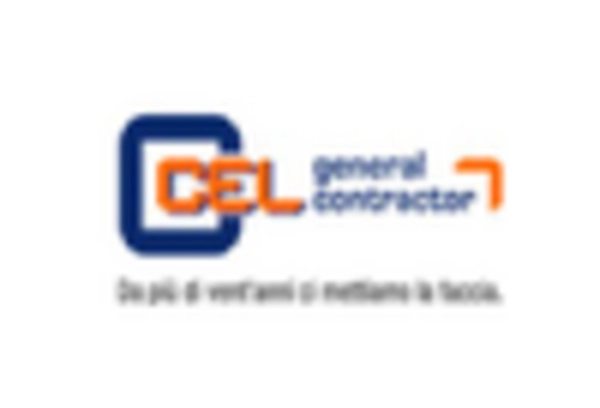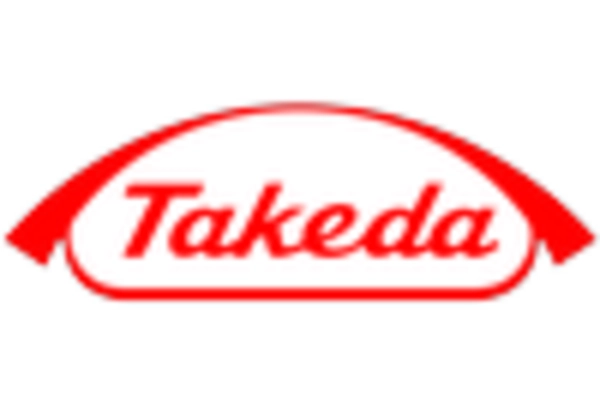Rising Incidence of Cancer
The Ubiquitin Proteasome Drug Market is experiencing growth due to the increasing incidence of various cancers, including multiple myeloma and solid tumors. As cancer rates rise, there is a heightened demand for effective therapeutic options. The Ubiquitin-proteasome pathway plays a crucial role in regulating cellular processes, and its dysregulation is often implicated in cancer progression. Consequently, pharmaceutical companies are focusing on developing proteasome inhibitors, which have shown promise in clinical trials. The market for these drugs is projected to expand significantly, with estimates suggesting a compound annual growth rate (CAGR) of over 10% in the coming years. This trend indicates a robust market potential driven by the urgent need for innovative cancer therapies.
Increased Investment in Oncology Research
Investment in oncology research is a key driver for the Ubiquitin Proteasome Drug Market. Governments and private entities are allocating substantial funds to explore new treatment modalities for cancer. This influx of capital is facilitating the development of innovative drugs targeting the ubiquitin-proteasome system. For instance, funding for clinical trials and research initiatives has seen a marked increase, with estimates indicating that oncology research funding could reach billions annually. This financial support is crucial for advancing the understanding of cancer biology and developing effective therapies. As a result, the Ubiquitin Proteasome Drug Market is poised for growth, with numerous projects underway that aim to translate research findings into viable treatment options.
Growing Awareness of Personalized Medicine
The shift towards personalized medicine is reshaping the Ubiquitin Proteasome Drug Market. As healthcare providers increasingly recognize the importance of tailoring treatments to individual patient profiles, there is a growing demand for drugs that target specific molecular pathways, including the ubiquitin-proteasome pathway. This trend is particularly evident in oncology, where personalized therapies are becoming the standard of care. The development of companion diagnostics is also enhancing the ability to identify patients who are most likely to benefit from proteasome inhibitors. Consequently, the Ubiquitin Proteasome Drug Market is likely to expand as more targeted therapies are developed, aligning with the broader movement towards precision medicine.
Regulatory Support for Innovative Therapies
Regulatory bodies are increasingly supportive of innovative therapies, which is positively impacting the Ubiquitin Proteasome Drug Market. Initiatives aimed at expediting the approval process for breakthrough therapies are encouraging pharmaceutical companies to invest in the development of novel proteasome inhibitors. For example, programs such as the FDA's Breakthrough Therapy Designation are designed to facilitate the development and review of drugs that address unmet medical needs. This regulatory environment fosters innovation and encourages the entry of new players into the Ubiquitin Proteasome Drug Market. As a result, the industry is likely to witness a wave of new products entering the market, enhancing treatment options for patients.
Advancements in Drug Development Technologies
Technological advancements in drug development are significantly influencing the Ubiquitin Proteasome Drug Market. Innovations such as high-throughput screening and computational drug design are streamlining the discovery of new proteasome inhibitors. These technologies enable researchers to identify potential drug candidates more efficiently, thereby reducing the time and cost associated with bringing new therapies to market. Furthermore, the integration of artificial intelligence in drug discovery is enhancing the ability to predict drug interactions and efficacy. As a result, the Ubiquitin Proteasome Drug Market is likely to benefit from a surge in novel therapeutics, with several candidates currently in various stages of clinical trials, indicating a vibrant pipeline for future growth.

















